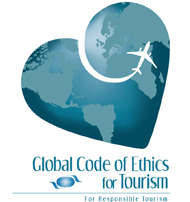World Committee on Tourism Ethics to focus on the exploitation of children, trafficking, poaching and accessible tourism
Share on social media
(Madrid, Spain, 26 February 2014). The protection of children from all forms of exploitation, the fight against trafficking, anti-poaching and accessible tourism for all are among the work priorities defined by the newly formed World Committee on Tourism Ethics (WCTE). The Committee met at UNWTO headquarters to identify the major challenges facing responsible tourism and define its Action Plan for the coming four years.
 The protection of children from all forms of exploitation, the fight against trafficking, anti-poaching and accessible tourism for all are among the work priorities defined by the newly formed World Committee on Tourism Ethics (WCTE).
The protection of children from all forms of exploitation, the fight against trafficking, anti-poaching and accessible tourism for all are among the work priorities defined by the newly formed World Committee on Tourism Ethics (WCTE).
The Committee met at UNWTO headquarters to identify the major challenges facing responsible tourism and define its Action Plan for the coming four years.
Under the chairmanship of Pascal Lamy (former Director-General of World Trade Organization - WTO), the World Committee on Tourism Ethics met for the first time in its new constitution as appointed by the UNWTO General Assembly in August 2013.
“The World Committee on Tourism Ethics is not destined to solve major political and economic issues at the global level; it will be a useful instrument in interpreting a frontier area, which is tourism ethics, by binding people together in an operational way”, said Pascal Lamy.
“One billion tourists crossing international borders every year can mean one billion opportunities but also one billion catastrophes; it is up to us to decide. Governments, companies and tourists themselves need to ensure tourism works as a force of good and I am convinced that the new Committee on Tourism Ethics will assist greatly in this endeavor”, said UNWTO Secretary-General, Taleb Rifai.
The Action Plan of the Committee for the coming four years will focus on:
- the exploitation of children in all its forms;
- trafficking;
- poaching and the illegal trading of wildlife;
- accessible tourism for all;
- promotion of fair models of all inclusive holidays; and
- unfounded ratings on travel portals which may impact the reputation of companies and destinations
The World Committee on Tourism Ethics is an impartial body responsible for interpreting, applying and evaluating the provisions of the the UNWTO Global Code of Ethics for Tourism.
About UNWTO Global Code of Ethics in Tourism
The UNWTO Global Code of Ethics for Tourism (GCET) is a set of principles designed to guide the development of tourism in a way that maximizes the socio-economic benefits of the sector, while minimizing any negative impacts. It was adopted in 1999 by the UNWTO General Assembly and endorsed by the United Nations General Assembly in 2001.
The World Committee on Tourism Ethics, a subsidiary organ of the UNWTO General Assembly, reports directly to the Assembly. Members are elected in their personal capacities and not as officials of governments or representatives of their countries.
More information:
Global Code of Ethics for Tourism
Resolution adopted by the UNWTO General Assembly A/RES/637(XX)
(Twentieth session, Zambia, Zimbabwe, August 2013)
Report on the World Committee on Tourism Ethics: Recommendations on Accessible Tourism
Available in: English | French | Spanish
 The UNWTO is an Honorary Member of ENAT. On the 16th of September 2011, a trilateral framework agreement was signed between UNWTO, Fundación ONCE and ENAT to develop the Resolution on Accessible Tourism for All (2005), providing advice on policy-making, awareness-raising, producing guidelines, and embarking on training and capacity building projects.
The UNWTO is an Honorary Member of ENAT. On the 16th of September 2011, a trilateral framework agreement was signed between UNWTO, Fundación ONCE and ENAT to develop the Resolution on Accessible Tourism for All (2005), providing advice on policy-making, awareness-raising, producing guidelines, and embarking on training and capacity building projects.
